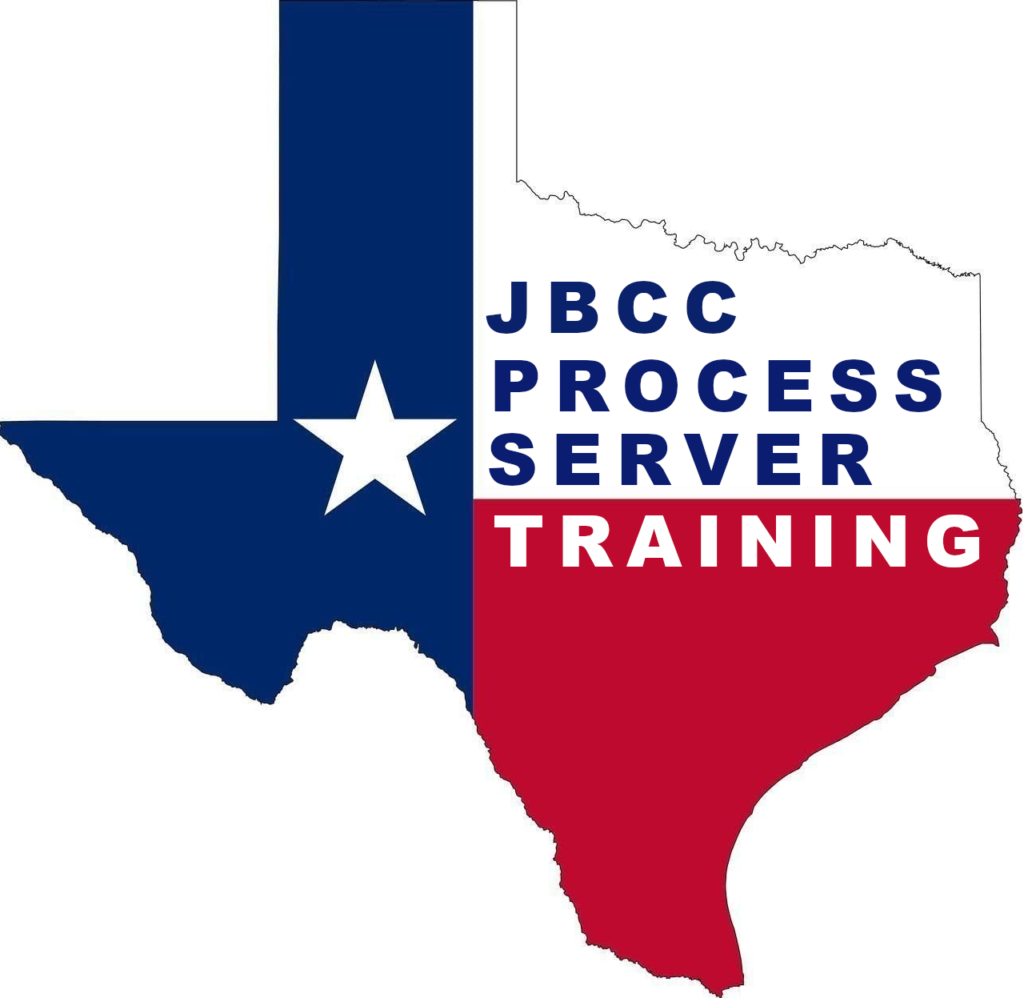

These courses aim to help process server professionals strengthen their skills and meet JBCC continuing education requirements.
This course is a refresher for basics of process server duties, manners of service, return of service and requirements, affidavits, and subpoenas. It covers definition of terms used in service of process and the JBCC rules that regulate Texas Certified Process Servers. It also covers any updates in the JBCC rules or Texas laws that regulate the process server profession. It covers the Texas Judicial System and covers the court structure and function of each Texas court as well as the different kinds of Texas judges that preside in those courts. It also covers the responsibilities of a process server and distinguishes what a process server must do in order to be in compliance with JBCC rules. It also gives examples of situations where additional action may be taken in order to be compliant. This course also covers the impact that process servers have on the judicial process, how important that process is, and gives examples of the relationship between process servers and the judicial process. This course also focuses on process server safety, de-escalation techniques, and ways to report and record process server safety issues or assaults.
This course defines what ethics is and goes over the many elements of ethics. It discusses and gives examples of moral values, duty, corruption, ethical decision making, ethical standards, conflicts of interests and many more topics on ethics. JBCC Code of Ethics will be discussed and students will be challenged with practical exercises to demonstrate knowledge and understanding of ethics and its role in the process server profession. This course also covers the Texas Penal Code and how it relates to the process server profession. It will cover specific penal code sections that a process server should be aware of as a part of their duties and responsibilities. This course also covers the Texas Rules of Civil Procedure and how it relates to the process server profession. It will cover specific rules that a process server should be aware of as a part of their duties and responsibilities. This course will give new skill sets by covering what court testimony is and prepares a process server on what to expect if providing court testimony. In addition, this course will cover the many differences in serving out of state service of process, what to expect, and how such service of process relates to JBCC certification.
In order to become a certified Process Server, you must:

We honor those who are currently serving and those who have served.
Not only is Emerald Shield Academy a veteran owned business, but we offer great discounts to military personnel and veterans. Ask us about the discounts before signing up to ensure you get the best price.
Definitions per section 55.001 of Chapter 55 Occupations Code:
The Commission may issue an initial certification to an applicant who is a military service member, spouse of a military service member, or a military veteran that:
To apply for Certification or Licensure as a military applicant, under sections 3.4 (a)-(g) of the JBCC Rules, you must do the following:
1. Submit the Application for Licensure via the online system on our home page.
2. Submit all required documentation for the items indicated below:
a. Documentation of being a military service member, spouse, or veteran, (such as military ID or other official documentation confirming you as being a military spouse);
b. Proof of holding a current certification or license as a process server in another state (such as a copy of your certification or license). You must be licensed or certified, in the other state, under the profession for which you seek licensure or certification in Texas. The documentation must verify you are certified or licensed, in the other state, to practice in the profession for which you are applying;
c. A letter of good standing from your current certification or licensing authority;
d. Documentation showing a permanent change of station order for purposes of establishing residency;
e. Letters of recommendation or a resume showing your work experience;
f. Proof of passing your state’s certification or licensure exam (if applicable); and
g. Documentation of your state’s current certification or licensure requirements. (Note: the documentation must be from your state’s licensing authority. Applicants cannot create the documentation themselves.)
Note: If you were certified or licensed with the JBCC within 5 years of the date of your application, skip items a-g and, instead, upload proof of your prior Texas certification or license and the name you were certified or licensed under.
3. Pass a criminal history background check by DPS and the FBI. Applicants that apply for certification online will receive the service code form via the automated email confirmation they receive after submitting their application for certification. They should check their inbox (and spam folder) for this correspondence.
To inquire about providing process server services as a military spouse applicant, under section 3.4 (h) of the JBCC Rules, you must submit your inquiry to the licensing specialist for this department at this email address: processservers@txcourts.gov
Should you have questions not addressed online, please submit inquiries to processservers@txcourts.gov.
There still may be time to renew. If the meet the below criteria you may still be able to enroll and renew your license.
See section 3.2 (f) of the JBCC Rules for a certification that has been expired for 1 yr. or more.
Important Note: Before starting the reinstatement process, you must email the licensing specialist at processservers@txcourts.gov so they can reactivate your profile, thereby allowing you to submit the application online.
When initially applying to reinstate an expired license, do not create a first-time applicant profile in our online system. Instead, you must do the following as an existing certification to start the licensure process over again.
1. Login to your existing certification profile in the online licensing system
2. Click the button to apply for new certification and pay the application fee.
Submit questions regarding this matter to the licensing specialist at processservers@txcourts.gov so staff may assist you.
All application fees are collected by the State and applications must be submitted directly to JBCC.
All fees are non-refundable.
First-Time Applicants: $200.00 (unless you are exempt as stated above)
Acceptable forms of payment: Credit Card or Debit Card
Lorem ipsum dolor sit amet, consectetur adipiscing elit. Ut elit tellus, luctus nec ullamcorper mattis, pulvinar dapibus leo.
Click edit button to change this text. Lorem ipsum dolor sit amet, consectetur adipiscing elit